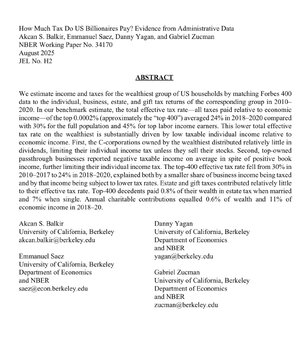I wouldn't mind seeing that study. For years, I have argued against the argument about double taxation of Corporate income. Doesn't hold because if its a good investment (think Warren Buffet) then they never sell. Meanwhile, the wealthy are getting the compound affect of much lower tax rates their corporate ownership brings. If its a bad investment and they sell, then why does anyone care that they made a bad investment. Plus, if bad investment then not much to tax anyway.
When you factor in the lower tax rates on Capital Gains, then the rich operate under a separate system. The only folks who pay higher tax rates that are meant for the wealthy are lottery winners.

